![]()
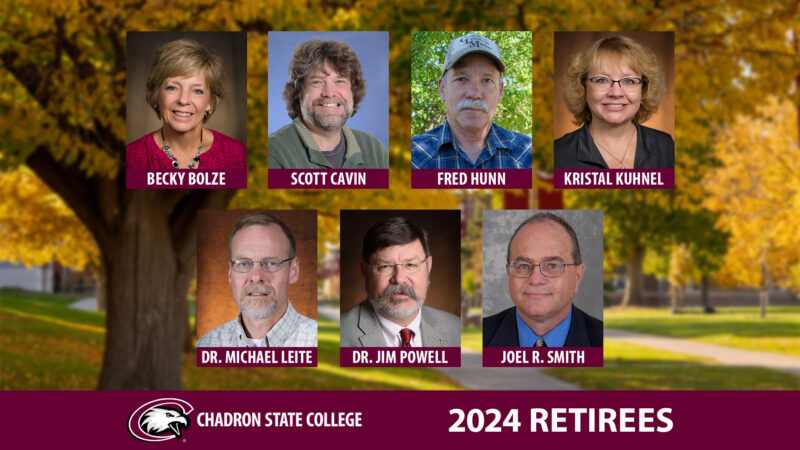
All Photos by Tena L Cook/Chadron State College
Chadron State College recently held its annual employee recognition lunch. Among those honored were six faculty, staff, or professional staff members who have retired or are retiring this academic year: Becky Bolze, Scott Cavin, Fred Hunn, Krystal Kuhnel, Dr Michael Leite, Dr Jim Powell, and Joel R Smith.
Becky Bolze
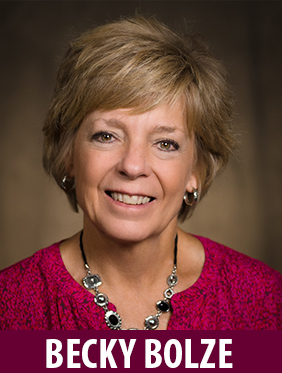
Bolze has worked at Chadron State College for 10 years. Bolze, an Office Assistant III, has worked within Admissions and Enrollment Management.
She said she enjoys working with incoming students, answering their questions, and helping them prepare for enrollment.
Bolze said she also enjoyed interacting closely with the Admissions’ Call Center student workers.
“That has been a huge highlight. It was enjoyable developing relationships, both with the parents and the students, and it’s been fun to stay in touch with a lot of them,” she said. “My very favorite part of the whole job was all of the personal connections and working with mainly incoming freshman students and their parents. It was really fulfilling watching those students succeed.”
Bolze and her husband, Ron, a retired Professor in the Rangeland Management department, also enjoyed hosting students at their home and making personal connections.
“We’ve been to lots of baby showers and weddings. It’s rewarding to make those lifelong connections with students,” she said.
Bolze also grew close to a lot of the Admissions recruiters.
“They’ve been a lot of fun to work with too, over the years,” she said.
Although Bolze is an Ohio native, she loves Chadron. She said that she and Ron are looking forward to spending more time with their grandchildren and watching more western Nebraska sunsets and sunrises.
The Bolzes work closely with their youngest child, Sadie, who has taken over day-to-day management of Bolze Ranch Angus, a herd the family has developed for 45 years. They have a keen interest in human nutrition and plan to support Sadie in Bolze Beef direct-to-consumer grass finished beef sales.
Scott Cavin
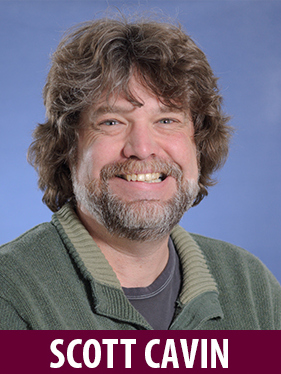
Cavin started in the Chadron State College Theatre Department in 1996. He was a native of California who came to Chadron from Georgia. He taught theatre design, theatre history, play script analysis, and designed sets and lights for more than 130 productions. About 15 years later, Cavin started directing and has directed 16 productions.
The performances Cavin has brought to CSC are popular, but also challenging.
“‘Extremities’ was uncomfortable for so many different reasons. But it was also a very popular and very powerful performance,” he said. “‘Vampire Cowboy Trilogy,’ ‘Extremities,’ and ‘The Play About the Baby’ all allowed me to work with the students through all the elements of a theatrical production.”
“The Evil Dead” set was designed by alumni Leo Haselhorst who is the Technical Director at Sky Light Musical Theatre in Milwaukee. In his final note of thanks to Cavin for his internship, Haselhorst thanked Cavin for mentoring him and acknowledged Cavin’s encouragement opened many doors for him.
Cavin became the department chair in 2019 and was excited that the administration allowed him to bring in professional guest artists each year.
“It was great for the students, allowing them to get a wide range of experiences and do some professional networking also,” he said.
Amy Campion, one of Cavin’s former students, came back to design the set of “Peter and the Starcatcher” and teach students about set design and painting.
He’s invited a wide range of alumni back to CSC as guest designers including Anna Owens for costuming, and most recently Casey Kearns, who was a student during Cavin’s first year. Kearns returned to design costumes for 2024’s “The Complete Works of William Shakespeare (Abridged)” and teach costume construction.
“I’ve got a lot of former students all across the country, working consistently,” he said.
In the fall of 2023, Cavin chose to tap three student directors with three different casts to perform “What the Constitution Means to Me.” His decision allowed nine actors to participate, in addition to the three directors.
“I talked to audience members who came back to see all three directors’ interpretations of the script. It was amazing how different they were, while still maintaining the same intent of the script,” he said.
Cavin’s retirement plans include moving to Kansas City and getting married. He anticipates that he and his wife will travel to visit family.
Cavin said he might walk dogs for a local dog daycare center. He plans to take a break from theatre for a bit although he expects to return to it at some point.
Dave “Fred” Hunn
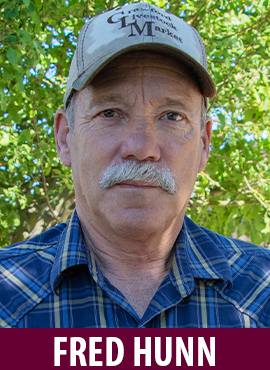
Hunn started at Chadron State College in 2014 as a Maintenance Worker III.
He describes his work as repairing and replacing campus property, as well as installing flooring and drywall in campus buildings.
“I’m really glad I came to work here. I’ve made a lot of new friends. They are great to work with. Especially Pat Mracek who has helped me so much with computer stuff,” he said.
Once in his 10 years of employment at CSC, Hunn was snowed out during the December 2022 snowstorms. Highway 385 south of Chadron was blocked and he could not travel from home to campus.
Before joining the CSC staff, Hunn was a self-employed horseshoeing professional for 31 years.
He and his wife, Lorie, who is a professor in the Family and Consumer Sciences department, lived in Lake Havasu City, Arizona, for 17 years in the winters and he worked construction while she taught school. They spent their summers in Chadron where he did farrier work.
In 2003, they and their children Sheyenne and Slade, moved back to the Chadron area. Slade works at Pine Ridge Job Corps and details cars. Sheyenne and her husband, Mike Sandstrom, are teachers in Chadron. They have two sons, Roman and Lukah.
Hunn’s retirement plans include completing some home repairs, fishing, and camping. He plans to pick up Roman on early-out days from school. He will also spend time on a ranch he co-owns with his brother in McPherson County in the Sandhills.
Kristal Kuhnel
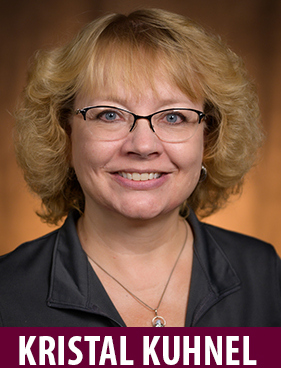
Kuhnel worked at Chadron State College for three decades before retiring in 2024. She started in 1999 as an Office Assistant I in Human Resources (HR) and answered the campus switchboard and covered the mailroom when needed for five years. She said the position was good experience and she was able to learn the names of employees and their locations on campus.
In 2004, Kuhnel became the assistant to the interim Dean of Arts and Sciences, Dr. Kathy Bahr. She was tasked with assisting with the 2007 HLC reaccreditation study and managed the physical evidence room, as well as the digital evidence room.
A year later, Dr. Charles Snare was hired in the Dean’s position and Kuhnel worked for him for four years. Their biggest initiative was the computer rotation plan. Kuhnel surveyed Arts and Sciences faculty, and using manufacturer’s recommendations, helped develop a planned computer rotation with Snare and others.
Following a reorganization, Kuhnel was named the Director of the Graduate program and worked closely with Dr. Margaret Crouse, the dean responsible for graduate studies, for five years.
When some graduate students experienced extreme medical circumstances, Kuhnel said she coined the phrase “policy with compassion” to describe the approach they took.
When she left the graduate program, she said it had grown 30 percent and 654 graduate students were enrolled.
For a year, she reported to Dean Dr. Joel Hyer as director of special projects. When the Director of Health Professions position became vacant, Kuhnel filled it for nine years.
She worked closely with students helping them track their progress toward graduate school requirements, hosted an annual Health Professions Showcase, recruited and organized interviews for incoming Rural Health Opportunities Program applicants, and organized an annual awards ceremony for all health professions students.
“I see many of my former students in their professions and it’s amazing all of these people are going to go into the world to make it a better place and I got to be a part of it,” she said.
She is working at the Pine Ridge Job Corps south of Chadron. She and her husband, Lorin, who works in maintenance, plan to spend more time with their grandchildren, daughter in North Dakota, and son in South Dakota. She also plans to continue genealogy work and taking photos of regional headstones and uploading them to family history websites to assist other genealogists.
Dr. Michael Leite
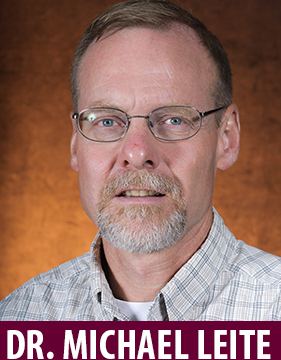
When Leite was hired at Chadron State College in 1996, he said he inherited a shattered mammoth skull glued to the floor of an abandoned museum.
His colleagues presented him with a sort of mandate, accompanied by the can-do spirit that still imbues the faculty: bring back the program and the museum. Now, after 28 years of working to meet that challenge, Leite will retire following the academic year.
Throughout his tenure at CSC, Leite tried to avoid being confined by the classroom. He re-established the Eleanor Barbour Cook Museum of Geology, an endeavor that revitalized the college’s geology museum and opened its exhibits to the public.
Together with his colleagues, he spearheaded summer field trips to places of interdisciplinary interest, from the desert and Pacific Coast to the rugged terrains of the Canadian Rockies and volcanoes of Costa Rica. Leite’s contributions to curriculum development were impactful, notably his shared role in creating the comprehensive major in Physical Science that provided students with diverse pathways in Physics, Chemistry, and Geoscience.
In 2013, he embarked on redesigning the Geoscience program to offer it in a predominantly online format, supplemented by immersive summer field camps. This innovative approach both expanded access to geoscience education and showed how CSC could respond to changing student demographics by embracing emerging technologies.
Leite is committed to the strong roles community engagement with science can play in environmental stewardship. He piloted ongoing monitoring of water resources in the Chadron Creek watershed, leading to funding from the U.S. Environmental Protection Agency and participation of a student team in the People, Prosperity, and the Planet design competition in Washington DC. This outreach expanded in recent years to a statewide collaboration with the UNL Water Center’s Know Your Well program. Additionally, he has served on the board of the Mammoth Site in Hot Springs, South Dakota, for 27 years.
In recognition of his teaching and scholarly contributions, Leite received numerous accolades, including the Teaching Excellence Award from Chadron State College and the Nebraska State Colleges Teaching Excellence Award. His mentorship spawned numerous student internships and research projects with NASA’s Jet Propulsion Laboratory.
Leite said he hopes he leaves a legacy of dedication to exploration, education, and environmental advocacy that will inspire future generations of scholars and stewards
of the Earth.
Dr. Jim Powell
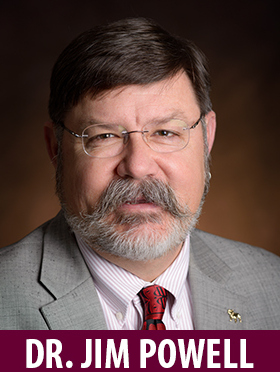
Powell, Chadron State College’s Vice President for Academic Affairs since 2020, will retire at the end of June.
“Choosing to work at such a student-centered and remarkable institution like Chadron State College has been a career highlight for me,” said Powell, who joined CSC as a Dean in 2015.
Powell helped shepherd the institution through its successful four-year affirmation review through the Higher Learning Commission (HLC), worked to establish the college’s Quality Initiative for HLC, and assisted with programmatic accreditation. He was also heavily involved with strategic planning and he chaired many committees on campus.
Powell also supported the development of new programs, such as nutrition and dietetics, a master’s degree in athletic training, focus areas for the MBA, the expansion of the para-professional teacher certification, an educational leadership program in Alaska, and the creation of an unmanned aerial systems certificate.
Powell was on the job for about eight weeks when the college decided to pivot to remote instruction during the early days of the COVID-19 pandemic and he was instrumental in helping facilitate the change in course delivery.
“I had the amazing chance to work with a lot of talented people,” Powell said.
Prior to being name the Vice President for Academic Affairs, Powell was the Dean of Professional Studies and Applied Sciences from 2015 to 2020. Powell, who received both his bachelor’s degree in English Education and his master’s in Linguistics with a specialization in Teachers of English to Speakers of Other Languages from Ball State University, began his teaching career as a middle school teacher in Indiana. He earned a doctorate in Curriculum and Instruction from Arizona State University and worked as an Assistant Professor at Ball State in Muncie, Indiana, for 13 years.
After Ball State, Powell worked at the University of Alaska-Anchorage for six years as Professor and Chair of Teaching and Learning before becoming a Professor and Director of the School of Education at Ferris State University in Big Rapids, Michigan. He worked at Ferris State for three years before joining CSC’s administration.
Powell and his wife Karla, have two adult sons and four grandchildren. The couple is looking forward to his retirement.
“Karla and I plan to travel both within the United States and abroad, and spending time with children and grandchildren is very high on the list,” he said. “Finally, a lot of fishing and woodworking are hopefully in the future.”
Joel R. Smith
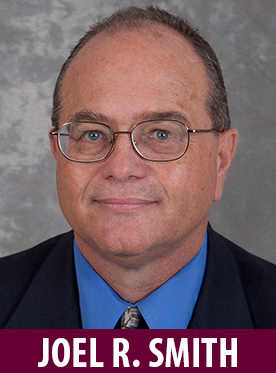
Smith, who served as Chadron State College’s Athletic Director for more than a decade, retired in early 2024. During his time at CSC, Smith oversaw the construction of the Chicoine Center, a Track and Field Complex, and Beebe Stadium, as well as initiating an annual scholarship banquet, When Eagles Dare.
“Chadron State College has been a wonderful place to work and live,” Smith said. “We were able to accomplish a fair amount during my time at CSC and I’m proud of everything the student-athletes, coaches, and teams accomplished.”
Smith’s entire career was spent in the athletic sphere. He was the commissioner of the Rocky Mountain Athletic Conference for 12 years prior to joining CSC, and worked as the director of athletics at Fort Lewis College and the assistant athletic director at Metropolitan State University of Denver.
Smith was active within the NCAA, serving on regional advisory and championship committees.
He was the chair of the NCAA West Regional Baseball Committee, a member of the Division II Championships Committee and D-II Television Task Force, and served as President of the Division II Athletic Directors Association. He was also the vice president of the Division II Collegiate Commissioners Association and president of the Colorado Chapter of the National Football Foundation. He also coached numerous youth sporting events and was the Cubmaster of Cub Scout Pack 217 in Monument, Colorado.
Smith was born in Canon City, Colorado, where his grandparents owned a dairy. Smith’s father helped with the development of power plants and the family lived in Washington for a few years when he was a youth before they moved back to Colorado.
While Smith was at Metro State, he met and married his wife, Catherine, who grew up in the Denver area. The couple has six children: Timothy, Hannah, Andrew, Daniel, Sara and Joshua.
